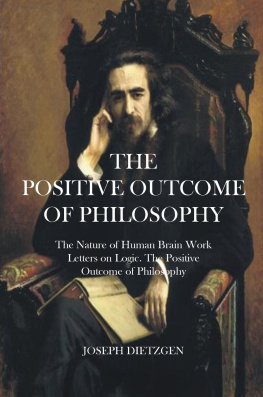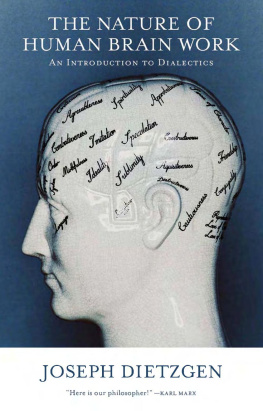Project Gutenberg's The Positive Outcome of Philosophy, by Joseph Dietzgen
This eBook is for the use of anyone anywhere at no cost and with
almost no restrictions whatsoever. You may copy it, give it away or
re-use it under the terms of the Project Gutenberg License included
with this eBook or online at www.gutenberg.org
Title: The Positive Outcome of Philosophy
The Nature of Human Brain Work. Letters on Logic.
Author: Joseph Dietzgen
Translator: Ernst Unterman
Release Date: June 10, 2012 [EBook #39964]
Language: English
*** START OF THIS PROJECT GUTENBERG EBOOK THE POSITIVE OUTCOME OF PHILOSOPHY ***
Produced by Odessa Paige Turner, Martin Pettit and the
Online Distributed Proofreading Team at http://www.pgdp.net
(This file was produced from images generously made
available by The Internet Archive/American Libraries.)
The Nature of Human Brain Work
A Renewed Critique of Pure and
Practical Reason
BY A MANUAL WORKER
Translated by Ernest Untermann
THE POSITIVE OUTCOME
OF PHILOSOPHY
The Nature of Human Brain Work
Letters on Logic. The Positive
Outcome of Philosophy
BY JOSEPH DIETZGEN
TRANSLATED BY ERNEST UNTERMANN
WITH AN INTRODUCTION BY DR. ANTON PANNEKOEK
TRANSLATED BY ERNEST UNTERMANN
Edited by Eugene Dietzgen and Joseph Dietzgen, Jr.
CHICAGO
CHARLES H. KERR & COMPANY
1906
CONTENTS
<__center_> <__inline-block___text-align___left_>
- VI. Consciousness is Endowed With the Faculty of Knowing
as Well as With the Feeling of the Universality
of All Nature - XI. The Distinction Between Cause and Effect is only
One of the Means of Understanding - XIII. The Extent to Which the Doubts of the Possibility
of Clear and Accurate Understanding Have Been
Overcome - XIV. Continuation of the Discussion on the Difference
Between Doubtful and Evident Understanding
</__inline-block___text-align___left_></__center_>
INTRODUCTION
THE POSITION AND SIGNIFICANCE OF J. DIETZGEN'S PHILOSOPHICAL WORKS
BY
Dr. Anton Pannekoek
In the history of philosophy we see before us the consecutive forms of the thoughts of the ruling classes of society on life and on the world at large. This class thought appears after the primitive communism has given way to a society with class antagonisms, at a stage when the wealth of the members of the ruling class gave them leisure time and thus stimulated them to turn their attention to the productions of the mind. The beginning of this thought is found in classic Greece. But it assumed its clearest and best developed form when the modern bourgeoisie had become the ruling class in capitalistic Europe and the thinkers gave expression to the ideas of this class. The characteristic mark of these ideas is dualism, that is to say the misunderstood contrast between thinking and being, between nature and spirit, the result of the mental unclearness of this class and of its incapacity to see the things of the world in their true interconnection. This mental state is but the expression of the division of mankind into classes and of the uncomprehended nature of social production ever since it became a production of goods for exchange.
In times of primitive communism, the conditions of production were clear and easily understood. Things were produced jointly for use and consumed in common. Man was master of his mode of production and thus master of his own fate as far as the superior forces of nature admitted it. Under such conditions, social ideas could not help being simple and clear. There being no clash between personal and social interests, men had no conception of a deep chasm between good and bad. Only the uncontrolled forces of nature stood like unintelligible and mysterious powers, that appeared to them either as well meaning or as evil spirits, above these primitive little societies.
But with the advent of the production of commodities the picture changes. Civilized humanity begins to feel itself somewhat relieved from the hard and ungovernable pressure of fickle natural forces. But now new demons arise out of social conditions. "No sooner did the producers give their products away in exchange instead of consuming them as heretofore, than they lost control of them. They no longer knew what became of their products, and there was a possibility that these products might some day be used for the exploitation and oppression of the producersThe products rule the producers." (Engels) In the production of commodities, it is not the purpose of the individual producer which is accomplished, but rather that which the productive forces back of him are aiming at. Man proposes, but a social power, stronger than himself, disposes; he is no longer master of his fate. The inter-relations of production become complicated and difficult to grasp. While it is true that the individual is the producing unit, yet his individual labor is only a subordinate part of the whole process of social production, of which he remains a tool. The fruits of the labor of many are enjoyed by a few individuals. The social co-operation is concealed behind a violent competitive struggle of the producers against one another. The interests of the individuals are at war with those of society. Good, that is to say the consideration of the common welfare, is opposed to bad, that is to say the sacrifice of everything to private interests. The passions of men as well as their mental gifts, after they have been aroused, developed, trained, strengthened, and refined in this struggle, henceforth become so many weapons which a superior power turns against their helpless possessors.
Such were the impressions out of which thinking men were obliged to fashion their world-philosophy, while, at the same time, they were members of the possessing classes and had thus an opportunity to employ their leisure for a certain self-study, without, however, being in touch with the source of their impressions, viz., the process of social labor which alone could have enabled them to see through the social origin of their ideas. Men of this class, therefore, were led to the assumption that their ideas emanated from some supernatural and spiritual power or that they were themselves independent supernatural powers. This dualist metaphysical mode of thought has gone through various transformations in the course of time, adapting itself to the evolution of production beginning with ancient slavery, on through the serfdom of the Middle Ages and of medival commodity production, to modern capitalism. These successive changes of form are embodied in Grecian philosophy, in the various phases of the Christian religion, and in the modern systems of philosophy.
But we must not regard these systems and religions for what they generally pass, that is to say, we must not think them to be only repeated unsuccessful attempts to formulate absolute truth. They are merely the incarnations of progressive stages of better knowledge acquired by the human mind about itself and about the universe. It was the aim of philosophical thought to find satisfaction in understanding. And as long as understanding could not wholly be gotten by natural means, there remained always a field for the supernatural and incomprehensible. But by the painstaking mental work of the deepest thinkers, the material of science was ceaselessly increased, and the field of the supernatural and incomprehensible was ever more narrowed. And this is especially the case since the progress of capitalist production has promoted the persistent study of nature. For through this study the human mind was enabled to test its powers by simple, quiet, persistent and fruitful labor in the search for successive parts of truth; and thus to rid itself from the overirritation of hopeless quest after absolute truth. The desire to ascertain the value of these new truths gave rise to the problems of the theory of understanding. The attempts to solve these problems form a permanent part of modern systems of philosophy, which represent a graduated evolution of the theory of understanding. But the supernatural element in these systems prevented their perfection.




